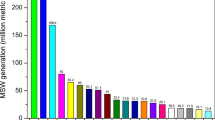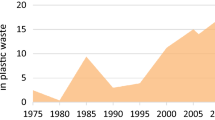Abstract
Source-separated collection system of household food waste has been implemented national wide in South Korea. Food waste recycling rate that means conversion rate to recycle is over 90 % in present. However, over the value of 90 %, we need to enhance the efficiency of food waste recycling process. We analyzed material flow of 24 food waste recycling facilities and calculated solid recovery rate to key-process. We found that 3–13 % of the solids from food waste outflows with foreign materials and 27–33 % of the solids outflow with wastewater. As a result, solid recovery rates are 65.3, 60.9, and 56.3 % in wet feed facility, dry feed facility, and composting facility, respectively. Alternative ways to recovery solid from wastewater or collection tools to exclude plastic bags, salt, and moisture content are required to make food waste recycling more efficient.





Similar content being viewed by others
References
Troschinetz AM, Mihelcic JR (2009) Sustainable recycling of municipal solid waste in developing countries. Waste Manag 29(2):915–923
Pokhrel D, Viraraghavan T (2005) Municipal solid waste management in Nepal: practices and challenges. Waste Manag 25(5):555–562
El-Fadel M, Findikakis AN, Leckie JO (1997) Environmental impacts of solid waste landfilling. J Environ Manag 50(1):1–25
Bartone CR, Bernstein JD (1993) Improving municipal solid waste management in third world countries. Resour Conserv Recycl 8:43–54
Zurbrugg C (2002) Urban solid waste management in low-income countries of Asia How to cope with the garbage crisis. Presented for Scientific Committee on Problems of the Environment (SCOPE). Durban, South Africa. http://slunik.slu.se/kursfiler/TN0280/20155.0910/Zurbrugg_waste_dev_.pdf/
McKay G (2002) Dioxin characterization, formation and minimization during municipal solid waste (MSW) incineration: review. Chem Eng J 86(3):343–368
Floret N, Mauny F, Challier B, Arveux P, Cahn JY, Viel JF (2003) Dioxin emissions from a solid waste incinerator and risk of non-Hodgkin Lymphoma. Epidemiol 14(4):392–398
Kee-Young Yoo and Sora Yi (2015) Evaluation and development of solid waste management plan: a case of Seoul for past and future 10 years. J Mater Cycles Waste Manag. 17:673–689
MOE (Ministry of Environment, Korea). Announcement on a ban of direct landfill of food waste (written in Korean). Accessed from 2015/10/01. http://www.me.go.kr/home/web/policy_data/read.do?menuId=10265&seq=1939
MOF (Ministry of Oceans and Fisheries, Korea). Promotion on the prevention of waste’s ocean dumping (written in Korean). Accessed from 2015/10/01. http://www.oceandumping.re.kr/web/web/?p_name=plan_3
Zhang H, Matusto T (2010) Mass and element balance in food waste composting facilities. Waste Manage 30:1477–1485
MOE (Ministry of Environment, Korea) (2001–2011) Waste Generation and Treatment Statistics (written in Korean). Accessed from 2015/10/01. http://stat.me.go.kr/nesis/index.jsp
MOE (Ministry of Environment, Korea) (2008a) Food waste generation and treatment (written in Korean). Accessed date: 2015/10/01. http://www.me.go.kr/
MOE (Ministry of Environment, Korea) (2008b) Food waste treatment facilities (written in Korean). Accessed date: 2015/10/01. http://www.me.go.kr/
Seoul Development Institute (2001) A study on Construction and Management of Food Waste Treatment Facilities (written in Korean)
Brunner PH (2003) Practical Handbook of Material Flow Analysis. Lewis Publishers
Themelis NJ, Kim YH (2002) Material and energy balances in a large-scale aerobic bioconversion cell. Waste Manag Res 20(3):234–242
Blengini GA (2008) Applying LCA to organic waste management in Piedmont, Italy. Manag Environ Qual 19(5):533–549
Acknowledgments
This research was supported by a Grant (15AUDP-B083704-02) from Architecture and Urban Development Research Program funded by Ministry of Land, Infrastructure and Transport of Korean government.
Author information
Authors and Affiliations
Corresponding author
Rights and permissions
About this article
Cite this article
Ju, M., Bae, SJ., Kim, J.Y. et al. Solid recovery rate of food waste recycling in South Korea. J Mater Cycles Waste Manag 18, 419–426 (2016). https://doi.org/10.1007/s10163-015-0464-x
Received:
Accepted:
Published:
Issue Date:
DOI: https://doi.org/10.1007/s10163-015-0464-x




